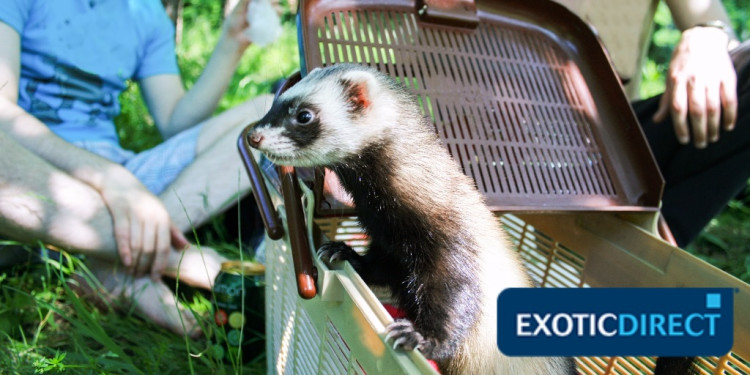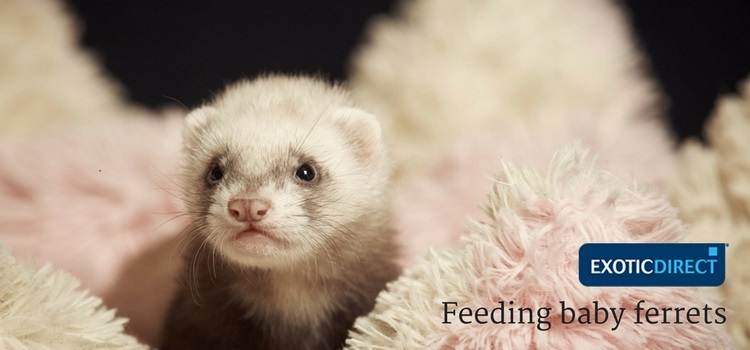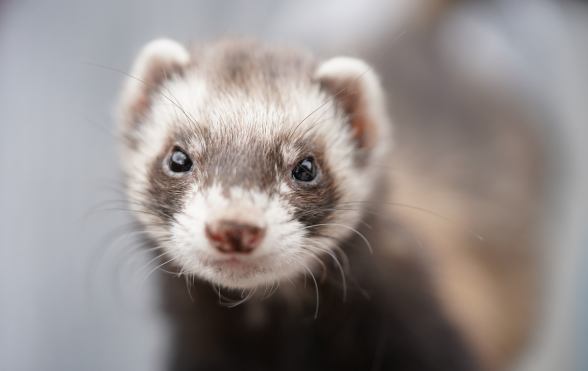Did you know that the carbohydrates and vegetable protein found in most fruit and vegetables can make your ferret poorly? And that your ferret’s diet should primarily consist of meat, meat and more meat. Our article aims to offer you lots of advice and guidance on feeding your ferret the best diet.
Is your ferret insured? Get a quote for up to £2,000 of vet fee cover | Insure up to 3 pets per policy | We’ve been insuring exotic pets since 1996 | Check out our customer reviews on Feefo.
Jump to: What do ferrets eat? | Ferret diet | What do ferrets eat in the wild? | What do you feed a baby ferret? | How often should I feed my adult ferret? | Tap water | Can a ferret eat dog food? | Can you feed a ferret eggs? | Can a ferret eat cat food? | Can a ferret eat fish? | Do ferrets eat nuts? | Do ferrets eat rabbits?
What do ferrets eat?
Ferrets are obligate carnivores, which means they must eat meat.
Raw meat is the best option, including whole prey. Ferrets can also eat kitten food, as it has a high meat protein content, baby food that’s high in meat protein, and dried ferret food, that’s high in meat protein.
As an occasional treat, your ferret can also eat eggs.
A ferret’s diet should consist of 32 – 38% protein and 15 – 20% fat.
Ferrets can eat the following raw meat:
- Chicken wings and stripped carcasses
- Turkey necks
- Rabbit
- Game birds
- Pigeons
- Minced beef
- Lamb
- Offal
- Lambs heart
- Raw animal bones for calcium and for cleaning your ferrets teeth
- Chicken
- Lamb
Source: The British Ferret Club, Feeding Adult Ferrets
Ferrets can also eat whole prey including:
- Mice
- Rats
- Chicks
Source: Susan Brown, DVM, Rethinking the Ferret Diet.
Although you may not like the idea of feeding raw food to your ferret, it replicates her natural diet, meeting her nutritional needs.
Make sure you buy good quality meat, and buy any rodents from reputable retailers. Don’t be tempted to try and catch any rodents yourself, as they could contain parasites.
You should therefore be aware that your ferret might also try to hide some food for later on. This could be dangerous, as raw meat could go off, and cause food poisoning.
 Your ferret is part of your family but make sure she eats the right food for her.
Your ferret is part of your family but make sure she eats the right food for her.
Ferret diet
Ferrets have a short intestinal tract and absorb nutrients inefficiently, which is one of the reasons their diet needs to be high in meat based protein and fat. Their bodies digest these easily, and they provide lots of energy.
You should minimise the amount of fruit or vegetables that you give your ferret. These contain complex carbohydrates which are high in fibre. Ferrets can’t digest fibre, meaning they have a low nutritional value.
A diet high in carbohydrates can also lead to disease in ferrets, as can vegetable protein that’s also found in fruit and vegetables. Find out more about foods that ferrets can’t eat and why.
Due to their short intestinal tract and high metabolic rate, ferrets must also eat little and often.
You may like to read this: Looking after and caring for a ferret
What do ferrets eat in the wild?
In the wild a ferret would eat every part of the animal including its bones, and this action would not only benefit her health, but offer stimulation and exercise her jaw.
Kristen’s ferret was very poorly in 2016. Her ferret was unable to walk and lost a third of his body weight in three weeks. She was covered by ferret insurance – read her review.
What dried ferret food can you buy?
You can buy Burgess ferret food; Chudleys; Optima and James Wellbeloved ferret food.
When buying dried ferret food ensure it contains more meat protein than any other product. If it’s high in carbohydrate and fibre then you should avoid it.
Did you know that our Ferret insurance can cover £2,000 of vet fees. Cover can be per pet (up to three pets on a policy) or per policy.
Food that ferrets can’t eat
Ferrets shouldn’t eat fruit or vegetables as a main part of their diet.
Ferrets shouldn’t be fed food containing complex carbohydrates as a main part of their diet as these contain fibre. Ferrets can’t digest fibre, which means the foods have a low nutritional value.
The reason they can’t digest these is because they have no cecum – this forms part of the digestive tract in many animals, and can produce bacteria that digests complex carbohydrates.
In addition a diet high in carbohydrate can lead to an excess of glucose in your ferret’s blood. This could cause insulinoma – cancer of the beta cells in the Pancreas according to Susan Brown, DVM.
Vegetables can also contain vegetable protein, which your ferret can’t digest very well. If she eats too much then it can lead to disease, such as bladder stones, ulcerations of the skin, gastroenteritis, reduced reproduction ability and her kits could suffer with poor growth.
Try and avoid the foods listed below, as they’re high in complex carbohydrates and fibre:
Fruit and vegetables you shouldn’t feed your ferret
- Apple
- Blackberries
- Lentils
- Lima Beans
- Pears
- Pigeon beans
- Pink beans
- Pinto beans
- Raspberries
- Spinach
- Small white beans
- Winged beans
- Bananas
- Blueberries
- Broccoli
- Brussel sprouts
- Dates
- Figs
- Green Beans
- Guavas
- Kiwi fruit
- Onions
- Oranges
- Split peas
- Dried plums
- Sweet potato
- Peanut butter
- Raisins
- Rice
- Bananas
- Salt
- Chocolate
Source: Fruit and Veggies – More Matters & The American Ferret Association
Your ferrets diet should be primarily meat and fat as in the wild. She will gain her energy from those foods, and not carbohydrates.
 Your baby ferret’s eating habits are shaped while they’re young.
Your baby ferret’s eating habits are shaped while they’re young.
What do baby ferrets eat?
You can feed your baby ferret a combination of fresh meat, goats or low lactose milk and water.
You can feed your baby ferret around four times a day using the following plan:
- Breakfast: Water and fresh meat chucks
- Lunch: Fresh meat
- Dinnertime: Fresh meat
- Suppertime: Meat on the bone followed by goats milk or a low lactose milk
(Thanks to The British Ferret Club for their Kit dietary advice)
Ferrets tend to bond with their food as Kits, and once they’re older it’s harder to change their eating habits.
You should encourage them to try lots of different foods when they’re young, to avoid problems later on in life.
It’s also a good idea to give them soft foods occasionally, such as baby food (high in meat protein), or dried food soaked in water occasionally.
This is so they don’t reject softer foods when they’re ill, and unable to normally.
How often should I feed my adult ferret?
Opinions vary on how often, so be guided by your pet – just remember not to overwhelm her with food, as she won’t be able to eat it all.
She may then resort to hoarding it for later. If it’s a meat product this could have obvious consequences in that it could go off before she eats it.
If you work during the day, then try leaving some ferret kibble out for her to eat when she’s hungry. Alternate ferret kibble and fresh meat when you’re at home.
With all this food, you also need to make sure that your ferret gets plenty of exercise in order to prevent her from getting fat.
Can I give my ferret tap water?
Yes, tap water is fine for your ferret.
If your ferret turns her nose up at, it may be because she can smell the chlorine. Try filtering it to see if that helps.
It’s really important to provide your ferret with lots of fresh water daily to avoid dehydration. Ferrets can get thirsty, particularly if they’re eating a dried ferret food, or if it’s the summer.
Can a ferret eat dog food?
No, it’s not advised to feed your ferret dog food. This is because it’s not high enough in protein and fat for your ferret.
Dog food also contains vegetable protein and fibre which cannot be digested by ferrets, and can cause disease.
Can you feed a ferret eggs?
Yes, you can feed your ferret cooked or raw eggs as a treat.
Limit them to once or twice a week, as more than this could cause constipation.
Can a ferret eat cat or kitten food?
Yes, your ferret can eat kitten food, as it has a high meat protein content. Cat food doesn’t contain the same protein levels, so isn’t as beneficial for your ferret.
Can ferrets eat fish?
Ferrets can eat fish, however it’s not naturally part of their diet. Some pre-prepared ferret foods do contain fish, which may not be to every ferrets’ taste.
It’s probably better to pick a pre-prepared food that contains meat rather than fish.
What treats can you give ferrets?
You can give your ferret meat or eggs (one to two a week).
You can also feed baby food with a high meat content. Any treats should be high in meat protein. Sweet, complex carbohydrate or dairy products can be harmful.
Treats should also be in small quantities to avoid filling her up too much, due to her small intestinal tract.
If you want to give your ferret specifically designed ferret treats, make sure that they don’t contain complex carbohydrates. Some products sadly do, which can be harmful for ferrets.
Do ferrets eat nuts?
No, ferrets shouldn’t eat nuts, they contain complex carbohydrates which can cause illness in ferrets.
We can cover ferrets for up to £2,000 in vet fees. Cover can be per pet or per policy. Why not find out more?
Do ferrets eat rabbits?
Yes, it’s likely that if provide your ferret with rabbit, she’ll eat it.
If you own a pet rabbit, keep them away from each other.
Ferrets are naturally hunters of prey, and will chase down wild (and domesticated) animals that her ancestors would normally eat in the wild.
Urinary tract stones in ferrets
Calcium oxolate is the compound in stones that can form in a ferrets urinary tract. They’re very painful for ferrets, and are caused by eating plant based proteins, dog food and poor quality cat food.
The stones are most common in ferrets aged three to seven years.
And finally….
We really hope that you’ve found this article helpful. Ferrets are such cute pets, and it can be so tempting to give them foods that they seem to enjoy. However, their little bodies might not.
Like with dogs and chocolate – don’t be tempted to give in because your ferret looks cutely at you. Because you want to keep her fit and healthy.
And with the right kind of food, and the love, care and attention you’ll give her, hopefully your ferret will live a long and happy life.
Do you need insurance for your ferret? Get a quote for up to £2,000 of vet fee cover | Insure up to 3 pets per policy | We’ve been insuring exotic pets since 1996 | Check out our customer reviews on Feefo.Disclaimer
This article is intended for guidance only. Although we’ve done our best to ensure the facts are correct, we naturally cannot guarantee this, as we’re not vets or nutritional experts. If you’re unsure about what to feed your ferret, you should consult your vet.

